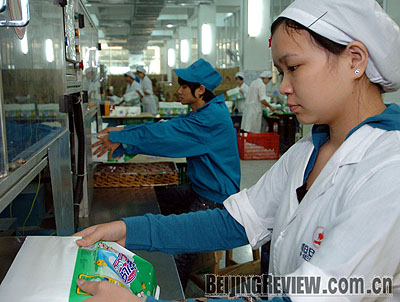|
|

THE LITTLE GUYS: China’s value-added tax reform scheme will encourage small and medium-sized enterprises such as Hengan International Group Co. Ltd., a tissue producer based in Fujian Province, to invest more in upgrading their machinery (ZHANG GUOJUN) |
On January 1, China's value-added tax (VAT) reform will be put into effect nationwide, transferring the biggest source of government revenue from a tax based on production to one based on consumption.
The State Council approved the VAT reform scheme on November 11, which was submitted jointly by the Ministry of Finance and the State Administration of Taxation.
China started collecting VAT in 1984 during the early stage of its reform and opening-up program. The government decided to impose a production-based VAT in addition to a sales tax on all goods and services to try to improve its fiscal revenue and rein in an investment spree.
Most of the 140-plus countries that have introduced VAT have implemented a consumption-based one. The biggest difference between production-based VAT and consumption-based VAT is that the latter enables companies to receive tax deductions on fixed assets investment, thus easing their tax burdens.
Jia Kang, Director of the Fiscal Science Research Institute under the Ministry of Finance, said during a group interview on November 21 that over the past two decades, VAT had played an important role in guaranteeing the government's fiscal revenue and that it had been a major source of China's tax revenue. Data from the Ministry of Finance indicate that China collected 948.42 billion yuan ($139 billion) in VAT in the first half of this year, accounting for 30 percent of the country's total tax revenue.
China's current production-based VAT does not exempt fixed assets purchases, so that companies are taxed twice while making investment in fixed assets, which has dampened their enthusiasm for upgrading technology and production facilities. This had prompted many corporations to call for the government to reform the VAT system. On July 1, 2004, the government launched VAT pilot reforms in the country's northeast and central regions.
According to Jia, the ongoing international financial crisis, which has taken a toll on China's economic development, has compelled the government to promote the reform nationwide, hoping it will boost enterprises' enthusiasm for upgrading equipment and technological innovations, thereby stimulating them to become the main players in the investment market. Jia noted that the healthy development of companies would enhance the steady and sound development of the national economy as a whole.
Major contents
According to the Ministry of Finance, as of January 1, 2009, enterprises in all industries will be able to obtain tax reductions on equipment purchases. But purchases of autos and yachts will not be considered "equipment purchases" and will be taxed as tax payables for individual consumption. It also scrapped policies that exempt imported equipment from VAT and remove foreign-funded companies from eligibility for tax rebates on domestic equipment purchases to put them on equal footing with domestic companies.
Small businesses and the self-employed who fall into the category of small-scale taxpayers will pay a universal 3 percent against the current 6 percent for industrial businesses and 4 percent for commercial companies. The government will increase the VAT on mineral products back up to 17 percent from the current 13 percent.
"Companies applaud the reform since the tax paid on equipment that was bought for investment purposes can be deducted now," Jia said.
Jia added that industries with heavy fixed assets investment, such as the mechanical equipment, petrochemical, power, water, gas, iron and steel, food and beverage industries, would get the most from the VAT reform, because they would not have to pay the high rates they do now if they invest more in equipment.
Experts estimate that the VAT reform will lower the government's annual tax revenue by at least 100 billion yuan ($14.7 billion), based on the tax revenue of 2007.
But Jia said the resulting savings of 100 billion yuan for small companies would help them increase their profits and incomes, thereby boosting investment and consumption in China.
| 